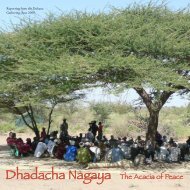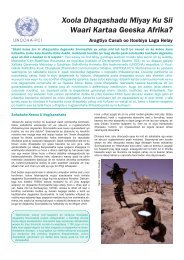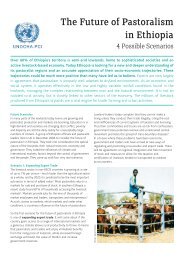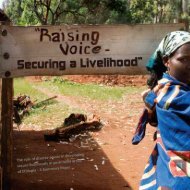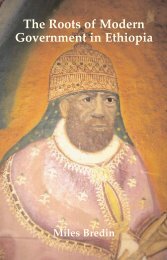Download PDF (1.47Mb) - the Website of the Pastoralist ...
Download PDF (1.47Mb) - the Website of the Pastoralist ...
Download PDF (1.47Mb) - the Website of the Pastoralist ...
You also want an ePaper? Increase the reach of your titles
YUMPU automatically turns print PDFs into web optimized ePapers that Google loves.
ABOUT<br />
THE KARAMOJA<br />
RESEARCH<br />
2. Role <strong>of</strong> <strong>the</strong> facilitators<br />
If a team forms itself as a result <strong>of</strong> its members’ own volition <strong>the</strong>n it may not need or want a facilitator. But, in<br />
instances when a team is being recruited, and when its members may not yet have a common purpose, good<br />
facilitators make an important contribution. Their task is to transmit action research principles by guiding, not<br />
directing, and backstopping not leading. They mediate between <strong>the</strong> research team and those who commission<br />
<strong>the</strong> research. But when assigning roles to team members, deciding what <strong>the</strong> work is for, whom to meet, when to<br />
do something, how to do it and so on, it is <strong>the</strong> team that decides, not <strong>the</strong> facilitators.<br />
The facilitators’ primary task with a recruited team is to build its power, confidence and independence. This<br />
begins with building respect between all <strong>the</strong> members. A team that has solidarity can work rigorously, and deal<br />
effectively with authorities or people who question its activities. It can draw on <strong>the</strong> combined talents <strong>of</strong> its members<br />
and <strong>the</strong>ir varied experience. It can take responsibility for its method, sources, findings and conclusions. Its<br />
members can be clear about <strong>the</strong>ir task and can explain it to o<strong>the</strong>rs. They can show that <strong>the</strong>y are using sound<br />
principles <strong>of</strong> analysis to come to <strong>the</strong>ir conclusions.<br />
To facilitate openness, good facilitators will support <strong>the</strong> team to ask more questions, never thinking that a matter<br />
is closed. They will encourage <strong>the</strong>m to avoid hearsay and question <strong>the</strong> voice <strong>of</strong> authority. In this way <strong>the</strong> facilitators<br />
are promoting openness to new ideas, making it possible for <strong>the</strong> team to come to new conclusions.<br />
To facilitate respect, facilitators will encourage <strong>the</strong> team to look for diverse people to talk to. They learn to<br />
streng<strong>the</strong>n <strong>the</strong> argument <strong>of</strong> those <strong>the</strong>y are talking to, ra<strong>the</strong>r than criticise <strong>the</strong>m, look down on <strong>the</strong>m, or assume<br />
<strong>the</strong>ir ignorance. Given that what researchers are being told by someone who has a different perspective is possibly<br />
true, <strong>the</strong> researchers must be encouraged to work out how it could be so. Facilitators will help <strong>the</strong> team members<br />
to recognise <strong>the</strong>ir own knowledge and <strong>the</strong>n add to it, building relationships and creating new understanding.<br />
To facilitate listening, facilitators will encourage researchers to clarify what <strong>the</strong>y are hearing, always inquiring<br />
if <strong>the</strong>y have heard right, seeking explanations <strong>of</strong> words, statements and claims and fitting <strong>the</strong>m to <strong>the</strong>ir own<br />
understandings.<br />
What do facilitators need to be able to do this well? They need to have a good understanding <strong>of</strong> local politics and<br />
<strong>the</strong> makeup <strong>of</strong> society in order that <strong>the</strong>y can constantly encourage <strong>the</strong> team to engage with and include diverse<br />
perspectives. Once <strong>the</strong> skills <strong>of</strong> openness, respect and listening become <strong>the</strong> norms <strong>of</strong> interaction within <strong>the</strong> team,<br />
<strong>the</strong>y become easy to use in interactions with o<strong>the</strong>rs in <strong>the</strong> research process.<br />
- 6 -





